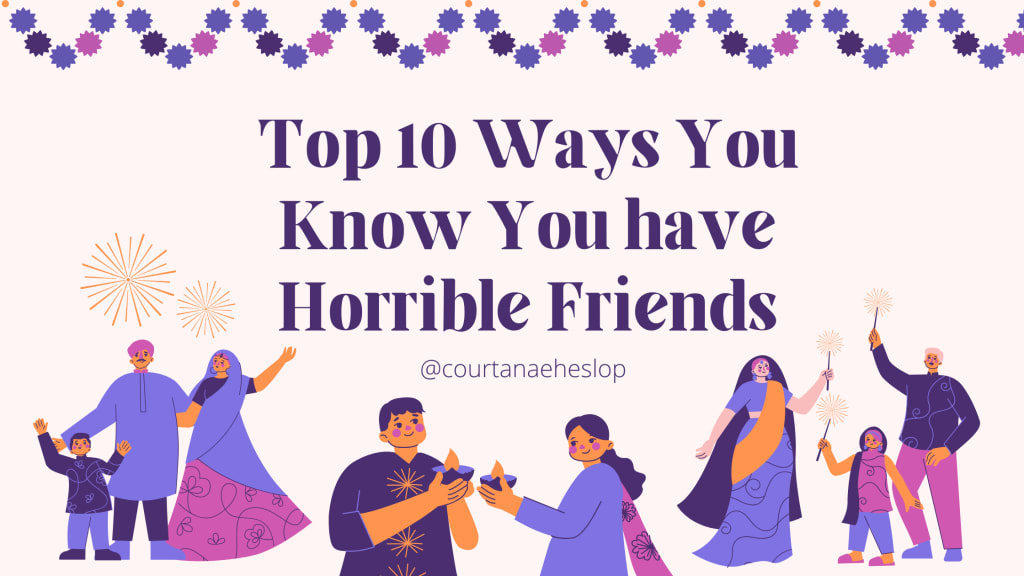Top 10 Ways You Know You have Horrible Friends
"Friendship is a beautiful thing. It's wonderful to have people in your life who you can trust and rely on, who support you through the good times and bad. But how do you know what makes for a good friend? What does it mean when someone says they're your friend, but then goes out of their way to hurt or betray you? Here are some examples of what it looks like when your friends aren't really good ones at all"

Friendship is a beautiful thing. It's wonderful to have people in your life who you can trust and rely on, who support you through the good times and bad. But how do you know what makes for a good friend? What does it mean when someone says they're your friend, but then goes out of their way to hurt or betray you? Here are some examples of what it looks like when your friends aren't really good ones at all:
The only time you ever hear from them is when they want something.
If the only time your friends contact you is when they need something, then that's a big red flag. A good friend should want to know what's going on in your life and be ready with advice whenever you're having trouble. If they're only contacting you when they need something, then it sounds like they don't consider you a true friend at all.
In fact, this is one of the clearest signs out there that someone doesn't care about their relationship with you: if all their interactions are just about them getting what they want from your friendship or using up all your time (either on social media or IRL), then there's no way that person could ever be considered a "good" friend to anyone else in their life.
If this sounds familiar for anyone reading this article, take some time today to reflect on whether or not those relationships are really worth keeping around or not; sometimes good friends can turn into bad ones over time!
They never offer to help if you're struggling with a big task or project.
If you're struggling with a big task or project, like moving to a new home, painting your house and so on, a true friend will offer to help you. If you say "I can do this!" and they don't come through when it comes down to it - you know they aren't really there for you.
A true friend will also be there when things get tough in other areas of life: You lose your job and need an extra month or two on the rent; one of your parents passes away unexpectedly - and on top of all that stressors (and likely cries), it takes three months for their death certificate to arrive because some bureaucrat screwed up somewhere along the way…a true friend would still be willing to lend an ear or even take over some responsibilities during this stressful period just so YOU can grieve properly without worrying about other things too much.
They talk badly about you to others who will tell you.
Your friends are talking about you behind your back. This isn't just a one-time thing, either. It happens often enough that you know it's not a fluke or an isolated incident. Your friends are discussing how they don't like your behavior and how they wish there were some way to get you to change. In fact, these conversations might happen so often that the other people in their lives have begun echoing their sentiments about what a burden you are on them - making it very clear that they feel like this is truly an issue for them as well.
If this describes your circle of friends, then I hate to break it to you: They don't care about you at all! Any friend who would treat another person like this obviously has no respect for that individual - and that's exactly why they're talking behind the person's back instead of just telling them directly what needs fixing in order for everything between both parties to improve…
When you get upset, they make fun of your emotions.
You know your friends are terrible when they make fun of your emotions.
When you get upset, they don't give you the support or space to process it like a normal human being would. Instead, they tell you that what you're feeling is "ridiculous" or "stupid." They might even go as far as telling you that being upset isn't worth it - which is just plain rude! It's okay if someone feels sad or angry sometimes; those feelings are natural and can be helpful for processing big life changes or trauma. If a friend makes fun of the way someone expresses their emotions and tries to invalidate them, then it's likely that this person has no respect for their friend's feelings at all.
Their idea of "support" is telling you what you did wrong instead of comforting you.
There's a big difference between "comforting" and "coddling." If you're having a rough time, your friend should be there to hold you when the chips are down. They should offer understanding and support in times of need - not tell you that the problem is all in your head or give advice on how to make yourself feel better.
If your friends have been telling you for years that your problems are all in your head, then maybe it's time to reevaluate where they stand in terms of character.
They always try to put themselves ahead, even if it means hurting you.
If your friends are always trying to put themselves ahead, even if it means hurting you in the process, then they're not good friends.
You know you have horrible friends when:
- They don't care about your best interests or what's best for you. They only care about themselves and their own success.
- They make decisions that hurt other people - and they don't care as long as it benefits them in some way. For example, if one of your friends steals from another person (or from an organization), it's not because she wants more money for herself; she does it because she knows that other person has better things than her own family does and she'll get some sort of satisfaction out of "stealing" from this person who seems so much richer than everyone else around them..
They talk about your problems as if they were their own.
When you're having a problem, your friends should be listening to all of the details and offering helpful advice. They shouldn't be taking over the conversation, agreeing with everything you say or asking questions about themselves instead of you. If they do this, then they don't care about your problems as much as they claim - they just want to take advantage of them!
They never give credit where credit is due-instead, they take credit for your work without asking and without saying thanks!
They never give credit where credit is due-instead, they take credit for your work without asking and without saying thanks!
I've had friends who would take my blog posts and post them on their own sites without asking. They also copied my posts word for word, but changed all the punctuation to make it look like it was written by them. They even plagiarized my work in their college papers! I eventually learned that I needed to keep a closer eye on what they were doing online because they would steal from me whenever possible!
To avoid this type of friend (or coworker), be sure to let people know when you do something so that they can acknowledge it publicly or privately when appropriate. A simple "thanks" goes a long way toward making someone feel appreciated and respected by others in their life - and once again: if someone takes credit for something you did? Let them know right away - this helps prevent further issues later down the road when no one knows who actually did what first
They are constantly complaining about small problems… and sometimes even large ones!
You know you have horrible friends when:
- They are constantly complaining about small problems… and sometimes even large ones!
- Instead of taking responsibility for their own lives, they blame others for the way things are. If a friend does something that upsets or bothers them, they don't want to fix the problem - they just want to complain.
- They don't want to improve their situation; they just want to complain about it until it goes away or someone else fixes it for them.
If anything goes wrong in their life, they blame it on someone else instead of themselves and their poor choices.
- If anything goes wrong in their life, they blame it on someone else instead of themselves and their poor choices.
- When you're trying to tell them how something will work out, they don't listen because they know better than you and have been doing this all along so what do you know about their area anyway?
- They always make excuses for why they can't accomplish things that other people easily accomplish without any excuse at all!
A good friend should be there for support, encouragement, and advice; not just when they want something from you.
A good friend should be there for you when they need something from you. But a great friend, one that we all want to have in our lives, is the one who is there for us when we don't need anything from them.
A good friend should encourage and support you; they are happy when things go well and sad when things go poorly. A great friend has your back no matter what happens in life - good or bad - and always encourages you to do your best regardless of what the outcome might be.
So if someone only wants to hang out with you or contact you when he/she needs something from you, then this person is not a true friend but rather an acquaintance who wants something from you (or thinks he/she does).
Conclusion
It's important to remember that there are many kinds of friendships in life-and not all of them are going to be perfect! The key is figuring out what kind of friendship is right for you. This can take some trial and error as well as time spent reflecting on how you want your relationships with others to feel.
About the Creator
Courtanae Heslop
Courtanae Heslop is a multi-genre writer and business owner.






Comments
There are no comments for this story
Be the first to respond and start the conversation.